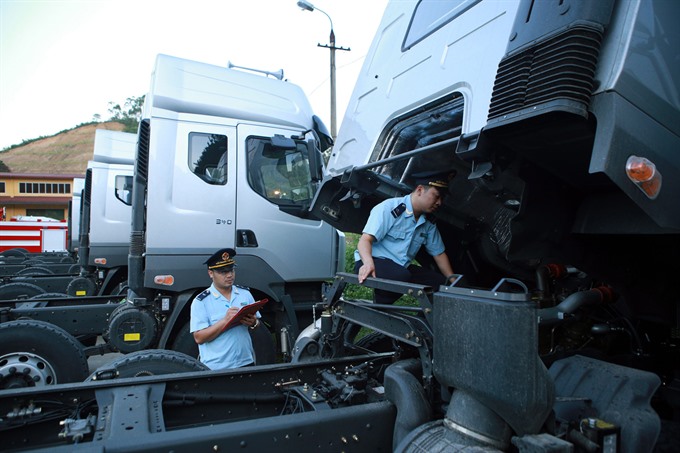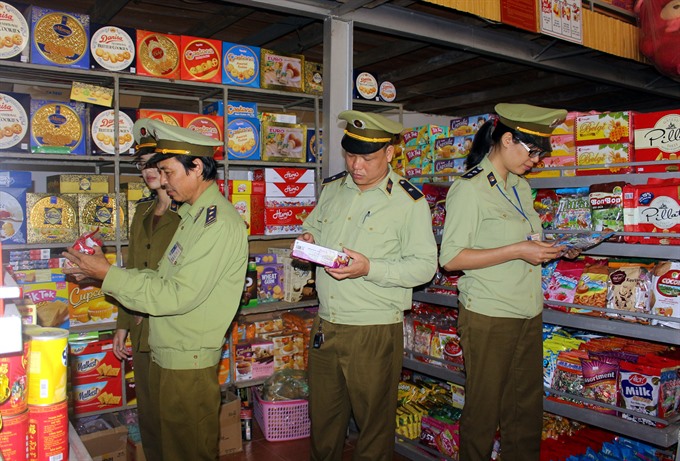 Society
Society

As the flow of goods intensifies in anticipation of increased demand during the Christmas and New Year season, there has also been an uptick in smuggling, authorities say.
 |
| Customs officials check serial numbers of imported tractors at Hữu Nghị (Friendship) Border Gate in the northern province of Lạng Sơn. The primary source of smuggled goods is from China, making border provinces in the north the gateway for such goods to enter Việt Nam. — VNA/VNS Photo Hoàng Hùng |
HÀ NỘI — As the flow of goods intensifies in anticipation of increased demand during the Christmas and New Year season, there has also been an uptick in smuggling, authorities say.
According to the Market Surveillance Agency under the Ministry of Industry and Commerce, the most popular smuggled consumer goods like clothing, footwear, food items, minerals like titanium or iron, and even illegal items such as wild animals or firecrackers.
Prime targets for smuggling are goods whose prices in Việt Nam differ greatly from the prices in other countries, heavily-taxed goods or restricted quota goods like liquor, tobacco, cosmetics and western medicine.
The smuggling of foreign liquor, tobacco and refined sugar in particular has seen a considerable rise recently in the border areas of the central and southwestern regions.
Meanwhile, the smuggling of live animals still occurs on a regular basis, mostly in the northern provinces that border China, like Quảng Ninh, Lạng Sơn, and Cao Bằng.
Illegal transporting of goods via railway freight is also rampant, according to the agency.
A lot of counterfeit, low-quality products or products that violate intellectual property rights – mostly clothes, electronic devices, and home appliances – are being illegally brought into Việt Nam from other countries.
According to the authorities, smugglers and their agents buy cheap products of questionable origin and quality that imitate well-known branded products, hire lots of people and use simple machines to apply labels before selling them into the mass market.
Quite often, the fake products are sold together with the real ones, making detection difficult.
In the domestic market, the trading of illegal goods, smuggled products or counterfeit products take place most in places of consistent high demand, like the economic centres of Hà Nội, HCM City, Đồng Nai, and Bình Dương.
Violations on pricing as well as trading in expired products also increase during the year-end holiday season.
Difficult to catch
Those involved in the trade have devised ever more ingenious ways to evade the capture of market watch authorities, the agency said.
The smugglers constantly switch locations and transport illegal goods back and forth between ports. The more relaxed regulations on bonded warehouses – temporary non-tariff storage for goods waiting to be exported to a third country – have also been increasingly taken advantage of to move goods into China: the smugglers would not make customs declarations as usually required of these items, or they just don’t re-export these items but slip them outside for domestic market consumption, the Vietnam News Agency reports
Illegal trade in threatened wild animals or their products (as listed under CITES, the Convention on International Trade in Endangered Species of Wild Fauna and Flora), like ivory carefully hidden inside shipments declared as timber from African countries, is also becoming more commonplace, the report cites customs authorities as saying.
According to the National Steering Committee 389 – the central authority on fighting smuggling, commercial fraud and counterfeit goods, in the last 10 months, 181,000 violation cases have been discovered and handled, a 10 per cent jump compared to the same period last year. Fines of VNĐ19 trillion (US$841,000) have been issued and 2,000 offenders have been punished.
Huge losses
Trương Văn Ba, deputy chief of staff of National Steering Committee 289, said that smuggling and illegal trade “caused huge losses to government revenues, reaching trillions of đồng a year."
The number of cases uncovered, despite being high already, “has not yet reflected actual reality,” Ba said.
“The reasons for this persistent situation are many, including lack of proper regulations, lack of technical standards, lack of a centralised agency with ultimate accountability despite numerous management authorities, and lack of co-ordination between and among localities and sectors.”
Phạm Quốc Hùng, deputy head of HCM City Customs, offered a different take, saying that current fines are no deterrent to repeated offences – the offenders would rather pay the fines, or even go to jail for a short period, and then just continue to earn the tempting big profits.
“There are ‘quarter companies,’ which are established and exists for just a few months, then disappear, their sole purpose is to facilitate smuggling,” he told the Thanh Niên (Youth) newspaper. — VNS
 |
| Market management officials inspect sweet products and baked goods at a store in Bắc Kạn City of the northern province of Bắc Kạn. — VNA/VNS Photo Đức Hiếu |




